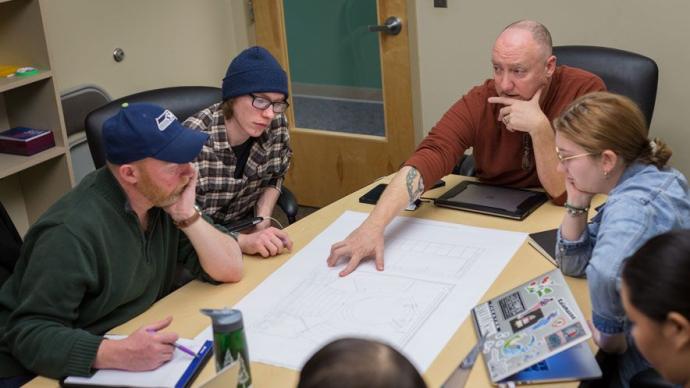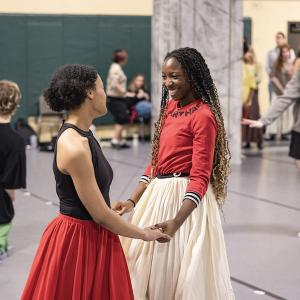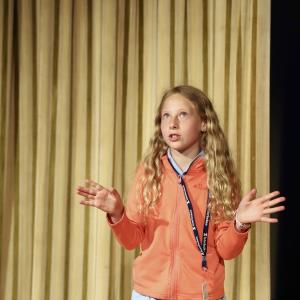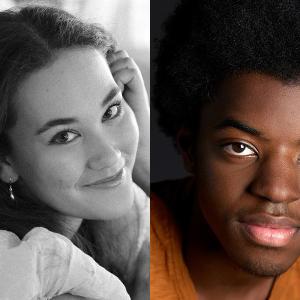Applications are still open for Arts Camp and Arts Academy. Programs fill quickly—submit your app today!
Meet your faculty: Stephen John
Instructor of Theatre Design and Production shares his vision for the program, favorite plays, and multifaceted approach to theatre.

Stephen John (top right) explains his class's set design for As You Like It to Instructor of Theatre Andy McGinn (bottom left).
Just two months into his tenure at Interlochen Arts Academy, Instructor of Theatre Design and Production Stephen John received one of the best compliments he’s ever been given from one of his students:
“You’re the Swiss Army knife of theatre.”
The compliment is not just a student’s exuberant admiration of a teacher; it’s a sharp observation of John’s diverse skills as a theatre designer, director, and educator.
After a 13-year career as a theatrical makeup designer, electrician, and carpenter, John refocused to his original objective of working as a theatre director. He has since directed performances at the University of Idaho, Curtis Theatre, Fullerton College, and Chapman University, and recently earned his M.F.A. in Directing for the Stage from the University of Idaho.
John joined the Interlochen Arts Academy faculty in September as the Academy’s first full-time instructor in Theatre Design and Production. Under John’s leadership, the Theatre Division hopes to establish Design and Production as a fully supported concentration for students interested in technical theatre.
We sat down with John to learn more about his plans for the Design and Production program, his holistic approach to theatre, and his secret love of Legally Blonde: The Musical.
You’ve been brought on as the first full-time faculty member for Design and Production. What are some of your plans for the program?
My primary goal is to increase enrollment. I have four students this semester, and I’m looking to set the cap for the program at eight.
I’ve also redesigned the course load. I’ve added two classes this year, and I’ll be adding a new class in every subsequent year. Right now, I’m teaching Fundamentals of Design—which was part of the curriculum before, although I’m teaching it differently. I’m also adding electives in drafting, scenic design, lighting design, and costume design. In each of these electives, students will apply what they learned in Fundamentals of Design. Stage Management will be offered every fall.
I’m also developing a two-semester course in makeup design, and a prosthetics class will be added in spring 2021. In fall 2021, I’ll rotate the makeup course out and add a two-semester projection design course.
How are your students involved in the Theatre Division’s shows this year?
Each of our students has a different assignment based on their interests and experience. One student, Chloe Lupini, has been stage manager for us for several years. I looked at her portfolio and said, “You’re done stage managing for now. You know how to do that. Let’s do something new.” She’ll be designing the set for As You Like It, which will be built by our Presentations team. Quinn Olsen has been an assistant lighting designer for several shows, and will be working on his first full design for As You Like It. Cookie Dutch is currently stage-managing The Lark, and Juliana Lee will be taking on the lion’s share of state management for the year with Matilda, the one-act festival, and A Chorus Line.
How did you hear about Interlochen?
I heard about Interlochen from former Instructor of Design and Production Bridget Williams, who used to do design and serve as an electrician for me when I was the production manager and technical director for Cardinal Stage in Bloomington, Indiana. She graduated from Indiana University with my wife. After she came to Interlochen, she talked to me about it and said, “You would be perfect for this summer gig.” Her endorsement was reinforced by Todd Quick, who has been on summer faculty for the past three summers and loves it.
You started here as a Camp faculty member. What’s it like to be working at Academy?
I’m so excited to be here. I have a two-and-a-half-year-old son, and raising him in this artistic environment has been wonderful. Working with these collaborators is absurd: The shows they produce, the quality of their work is outstanding… I was in the casting meeting for this season. The care and concern that every one of the faculty had for these students, over their own ego and over their own shows, was and is paramount. They’re great people to work with.
You’ve worked as a stage manager, designer, technician, and director. How does your holistic knowledge of theatre inform your work as an educator?
During my undergraduate studies, I took every design class. I knew that I wanted to be a director, but I wanted to be able to have conversations with designers from an educated point of view. I can speak intelligently about the design process, aesthetics, art history, the actual technical aspects of how we do something, and how we do stunts safely. I like to think that I have a really well-rounded view of theatre.
I had the opportunity to become an Equity stage manager, but I turned it down because I knew stage management wasn’t where I wanted to live. I was a union stagehand for 13 years, and I’m now in the Stage Directors and Choreographers Union. I’ve talked the talk with all of those people. So as I’m teaching, I’m able to share real-world experiences and real-world examples, not just theory.
You’ve had the opportunity to work with actors of a variety of ages, from very young actors to amateur and professional adults. What’s special about working with this age group?
I’ve realized what a huge responsibility I have as their teacher at this point in their lives. I’m in a position to help them decide what to do, how to get into college, and what college they choose, which will determine their path for the next 50 years. That’s a great amount of responsibility—much more than I had when I was teaching at the college level. In college, students have an idea of what they’d like to do, and it’s their responsibility to make it happen. But in high school, I’m helping students make those choices and navigate that world.
There’s not much difference between our students and upper-level college students ability-wise. They’re so focused, and they’re living in a nurturing, artistic environment that fosters change, growth, and risk.
I believe that risk is very important: In my syllabus, I state that the only way a student will not do well in my class is if they don’t take risks. I don’t let my students play it safe. Now is the time to take risks; once you’re a professional, there could be financial implications to a risk that doesn’t pay off. It could affect your job, and even what you want to do for the rest of your life. Students are so afraid of risk because they’ve been trained to look for the grade. They want the A, but I don’t care about the A. I care about the risk, and about the process of making theatre.
What’s the biggest thing you hope your students take away from working with you?
There’s one thing that I say constantly: Be a good human. I know that seems pretty general. I encourage my students to be good in regards to the people they work with and how they work. Theatre doesn’t need to be combative; we can work in a healthy and respectful way with everyone.
I also want them to walk away with a skill set and a strong portfolio that will help them get into colleges. Lastly, I want them not to be afraid to fail at something they’ve never done before. I always tell them, “Never apologize in my class. Just acknowledge that you did something wrong, fix it, and don’t repeat it. Have responsibility and onus.”
What are some of your favorite plays/musicals?
That changes all the time! Hadestown is killing me again, as is Floyd Collins. My musical guilty pleasure is Legally Blonde—it’s such a good musical, and thematically appropriate. I also love A Chorus Line. As for straight plays, I enjoy classics like Medea, but I’ve been really focused on new works for the past two years. I understand why we do the classics or “canon” works, but so much great work is being created: hundreds and thousands of plays are just waiting for us to read them and give them life. People sometimes ask me what my ‘bucket-list’ show is, and I always say “I haven’t read it yet.”
What are your hobbies outside of theatre?
I cook a lot and I spend as much time with my wife and two-and-a-half-year-old son. Anytime that I can spend with them, focused on our family, is time well spent.
Learn about our Theatre Design & Prodcution programs at Interlochen Arts Academy and Arts Camp.





